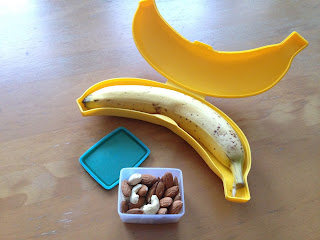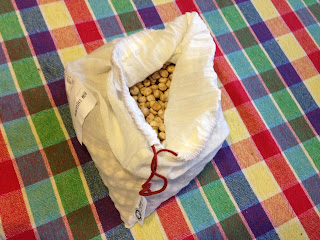After the first week of our Plastic Free October experiment - which for me was the hardest, as it meant figuring out so many things: where to buy something from, how to find an alternative, how to make it myself - we got the hang of our newly adopted plastic free lifestyle, at home at least. However, we are often on the go: at work, travelling or meeting friends for food or drinks, and this of course adds other challenges into the mix! That’s why I thought I’d share a bit about my experiences with preparing for those moments, as well as a few failures ;)
Preparation is key
On work days there are a few items that I will always carry with me: my water bottle, tupperware for food, and my own cutlery. I usually try to bring my own lunch to work, and take it with me in a tupperware, as well as cutlery and a plate if needed (or I use some from the nearby kitchenette). I try to also keep some snacks on my desk for those mid-morning or mid-afternoon hunger pangs, such as crackers with hummus or ajvar, and I usually bring a small box of nuts and some fruit with me from home (for bananas I even have a banana box protector case, so as to avoid those dreaded squashed-banana-bag-situations, you know what I mean!). In the case of emergency hunger attacks, the university canteen also offers some unpackaged snacks: cookies or Oh So Yummy bars (made with nuts and dried fruits). To make coffee in the office I use a French press, which is made with just the ground coffee and water. The coffee I buy in bulk (see previous blogpost) and bring in a glass jar to work. I keep a mug for tea and coffee at my desk, and also have a reusable coffee cup, in case I want to buy some coffee for take away from a cafe nearby or when I’m out for meetings or running errands.
Snack provisions for during the day: fruit, nuts & crackers with spread
Some days I don’t manage to prepare my own lunch, and on those occasions I usually buy something from the university canteen, the Food Faculty, or another cafe around university. At the canteen they usually serve everything in take-away boxes and with disposable cutlery. I always ask for my food on a plate and with real cutlery, and although I’m happy to report they always provide me with these on request, I think it is very sad to see the wastefulness of their operation. I sent them an email to ask why they cannot offer their food served on a normal plate with cutlery to everyone, and they replied saying that they are “mainly focused on a take-away / grab and go concept”. However, many students do not take their food away, but eat it directly then and there in the canteen. The Food Faculty staff did state that they “will definitely look into this and see whether we can have crockery and cutlery available for any customers wishing to use that rather than disposable”, which they have not done so far (2 weeks later), so I will follow this up and see if there are perhaps any students groups (KSU, Y4TE?) who want to collaborate to put some pressure on them.
I take any waste I create at work or during the day home with me, usually in the tupperware container I have in my bag anyway (organic waste & paper to compost in our compost bin, glass waste to wash and reuse, or recycle).
Reusable coffee cup for take away coffee and French press and coffee supply
My trusty Dopper water bottle
As I explained in my first blogpost about our plastic free month, water is a tricky one in Malta. In October it is generally still very hot, so I usually drink 2 to 3 liter of water a day, and if you’re out all day that puts considerable strain on your back, or alternatively, you need to plan for how you will refill your bottle. Unfortunately, this is not so straight forward (yet!) in Malta, seeing as the water from the tap is not really palatable. At university there are some public refill stations, where you can fill up your bottle or drink straight from the fountain. Alternatively, I’ve asked at restaurants/cafe’s if I can refill my water bottle from their bulk drinking water source against a small payment (depending on the establishment this could be from their own Reverse Osmosis system, such as at The Grassy Hopper, or from large 19L H20 bottles, which many places use for their own use, for making tea/coffee or for their employees). In my opinion, installing more public drinking water sources and refilling stations (and simultaneously encouraging people to bring refillable water bottles) could be a great and easy way to reduce small plastic bottle use, seeing as locally many people buy several bottles a day, creating a huge amount of plastic waste that can be easily avoided.
Practice makes perfect
A lesson learned is how important it is to always keep in mind to think what could come with plastic when eating or drinking out, and to remember to ask for straws/plastic cutlery/cookies wrapped in plastic to be omitted from your order. I made a few small mistakes there unfortunately. For example, one day last weekend I was out with a friend and too caught up in conversation to notice that the iced coffee I ordered would come with a straw, and then the same thing happened later that day while ordering a juice… not my finest moments this month! There are also still some products I haven’t replaced yet, especially products I don’t use very often or a lot of, such as make-up. On a particular day this month I was feeling guilty about this, but then later realised that ultimately this is an experiment, I have to accept that it is not going to be perfect from the start, and there is no need to change everything all at once; it’s a process we’re going through and trying out, and this is only the start of a constant quest of looking for alternatives and ways to reduce waste. On the other hand, I am happy to report that we really have hardly created any waste this month! Most of the packaging waste we created was paper, which we tear up and add to our compost heap, and glass jars, which for the most part we wash and reuse at home. There have been some aluminium cans and some glossy paper (newspaper magazines for example) that still go with the recycling waste, and some glass bottles that we recycle separately, but that’s about it!
I am aware that most of my reusable containers (for example, my water bottle, banana box and tupperware) are made of plastic. The purpose of this experiment was to cut out single use plastic, and in terms of reusable items I am using what I already owned. However, there are many more sustainable and hard-wearing options available (e.g. stainless steel, glass or ceramic options) that I would certainly opt for if I were to replace any of the items I already have. From my research I found for example the following options:
Thanks for reading! I’m hoping to wrap up the experiment with a final blogpost next week with some reflections on this month, and looking forward to the future to see what changes we are planning to make permanently :)











